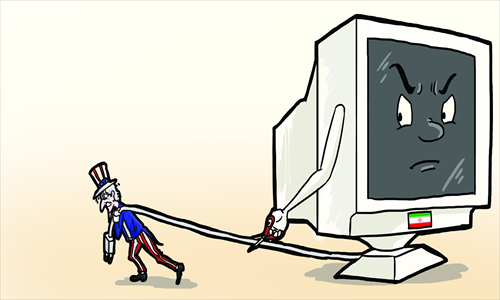US online aggression drives cornered Tehran into isolation

Editor's Note:
According to a recent statement by the Iranian Ministry of Communication and Information Technology, Iran plans to cut access to the Internet in August and replace it with a national intranet. Web sites such as Google, Hotmail, and Yahoo will be blocked and replaced by government-administered services. What sparked this plan? Can Iran survive economically if cut off from the US-dominated global Internet? The Global Times invited two experts to give their thoughts.
Iran already has the largest number of netizens in the Middle East. According to the Agence France-Presse, about 33 million Iranians are online.
Though the Iranian government has already announced it will implement this plan to cut access to the Internet, it will face a lot of obstacles.
It's difficult to conceive of a national intranet which is completely isolated from the outside Internet. Besides, even to a country like Iran whose economy is quite isolated from the Western world due to sanctions, Internet offers convenience for trade and business. Limitations on the Internet will influence investment from Russia, China and other trade partners.
But on the other hand, Iran was driven by necessity to introduce this policy. Several years ago, Twitter, an online social networking service, almost led to a revolution in Iran. And Iran was the target of the Stuxnet virus, a joint Israeli-US operation aimed at impeding its nuclear development.
On 2012 Persian New Year day, US President Barack Obama told Iranian people that the Iranian regime has set up a barrier which "stops the free flow of information and ideas into the country, and denies the rest of the world the benefit of interacting with the Iranian people." The US equaled the freedom of Internet with their democratic values and imposes their own definition of network freedom on others.
Western countries such as the US have occupied an absolutely advantageous position in network control for a long time. There are currently 13 root name servers specified, 10 of which are located in the US. The US has the capability to cut off the Internet of any country in the world. This unbalanced position has threatened the network security of other countries.
Network security has been a very important part of a country's national security. Different countries use different methods to safeguard their network security.
Some scholars promote the separation of the military Internet and the civilian Internet. Others appeal to the agreement of "no first use of online warfare." However, due to the technical characteristics of the Internet, this will be difficult to achieve.
Iran's plan of establishing a separate Internet will be hard to carry out. But anyway, Iran has triggered off the first shot for the rights of network control. Even a single spark can start a prairie fire. The Internet is a public resource which cannot be occupied by only a few developed countries like the US.
Fundamentally, comparatively backward states can safeguard network security only by developing their own technologies. Only in this way can they take the initiative in any future global online conflict.
On the other hand, all countries should join together to resolve the problem of global network security.
Developed countries monopolize the discourse power of making the rules of the Internet. Therefore, backward states should enhance communication and cooperation to break though this monopoly.
Only by these efforts can we institutionally establish fair rules online and safeguard network security.
The author is a PhD student in the School of International Relations and Public Affairs of Fudan University. opinion@globaltimes.com.cn